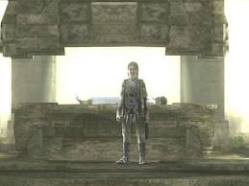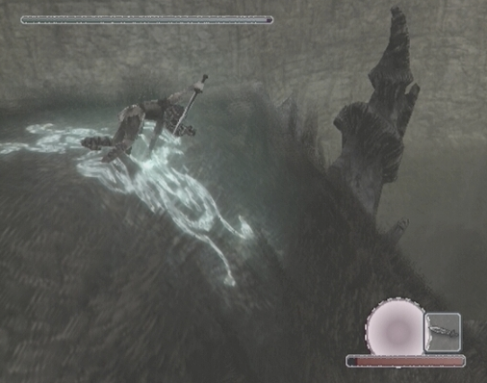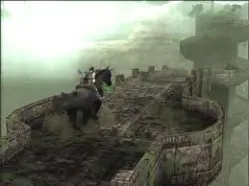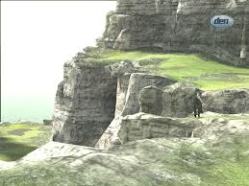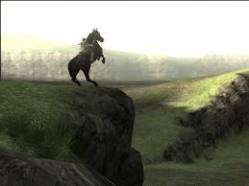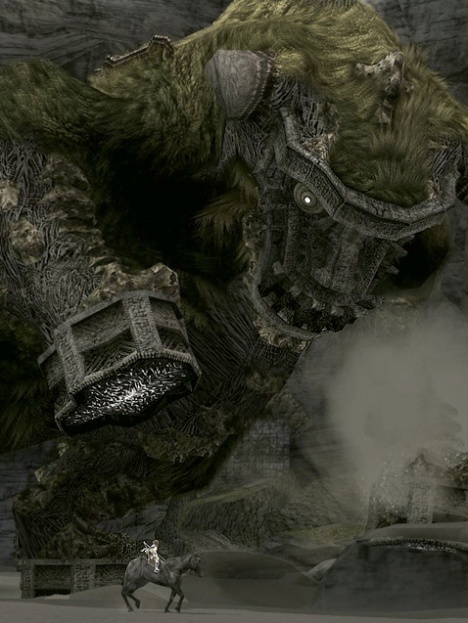Shadow of the Colossus is a game at the forefront of the debate as to whether video games are truly an art form, due to the experience, themes, and overall feel of the game. In the guise of an action-puzzle-adventure-RPG, Shadow of the Colossus creates much food for thought in this debate. The main argument for this is that the game itself includes a wide array of themes, and depends itself upon a large amount of audience speculation – many questions are left unanswered, deliberately, to provoke thought, much like art itself. Created by Team Ico as the spiritual successor to another of their games, Ico, Shadow of the Colossus is a truly beautiful game.
Of the many themes featured within the game, all are open to speculation and impossible to fully answer – the themes of rebirth, death, love and futility are all touched upon, even to the point where the audience themselves are drawn into the game’s events. This, of course, deepens the emotional impact of the storyline, although the lines between the interactivity of the game and the futility of certain scenes are frequently blurred. The player must act upon the selfish wishes of the avatar, Wanda, despite their better judgment – and, even, begin to justify just what he commits.
Shadow of the Colossus poses as a traditional fairytale – the stoic hero must rescue the beautiful maiden, and the maiden herself, Mono, is the epitome of innocence. Killed for something she cannot control, clad in a white dress, surrounded by doves and soft white light, she is the literal embodiment of innocence within the game, directly juxtaposed to a cruel, injust world around her. The cruelty of the world- where she is killed in cold blood, where Wanda himself kills in cold blood, and eventually dies, is softened by her presence. Wanda, the hero, rarely speaks, and though he is presented as the hero even he eventually becomes corrupt (throughout the game his appearance becomes slowly more monstrous as his humanity is eroded) and acts in increasingly selfish ways. Mono is the only one to stay pure and innocent throughout the entire game. Wanda’s eventual demise is his fault and it is here the theme of love comes into play, along with the theme of futility as a narrative device. The futility becomes apparent for the player, who will inevitably notice Wanda’s degrading physical state, which is used as foreshadowing for the tragic culmination of events.
Wanda’s love for Mono leads him on an epic quest, but also leads him to break several of the laws of mortals, a fact re-iterated by the God Dormin, and in doing so, by the end of the game he is merely being punished for his sins. Wanda had the choice to walk away, but he instead chooses to cling on to his love, refusing to let her die – if he had let go, he could have walked away with his pride, his life, and much more besides. Here the theme of undying love comes into play, another traditional fairytale archetype. However, much more like the darker, older fairytales, Shadow of the Colossus, though seemingly innocent, is in fact quite a dark, cynical tale. The hero of the tale could have chosen to let go and move on, but instead he sacrifices his freedom and his life in order to protect, and cherish, the one he loves. There is no stereotypical “happy ending” for them, for the end; although in a sense, the ending is bittersweet. Although Wanda is reincarnated as a horned baby, Mono brings him up, and thus they can never truly be together. In trying to save her and rekindle their romance, he forsakes their own relationship. His refusal to let go sacrifices not only his life, but the romance he was trying to save – instead of preserving his memories and moving on, he goes out and presumably upon his reincarnation, has forgotten entirely about their romance. The events of the game are also needlessly cruel, and suggest, perhaps, that revenge never pays – in a sense Wanda is avenging the death of his love, as well as trying to bring her back.
We start the game with Wanda entering the temple, and engaging the God Dormin, who awakens and offers Wanda an immense task in a trade-off for the life of his lover. The price for his wish? He must kill 16 Colossi (that’s giants to you and me), dotted throughout the land, in order to bring her back. The majority of these colossi are gentle, lumbering (and sometimes slumbering) throughout the land, until they are roused by Wanda, and thoughtlessly slaughtered. Some act in self-defence, but others simply walk around whilst the player scales, then kills them. Their deaths are not kind. The player is compliant in this, ultimately the one who causes Wanda to act as he does, as the player controls him.
In many ways, Wanda is the villain of this game, and this is not realised till the penultimate scenes, in which the Shaman divulges several facts. Dormin, the God who Wanda answers to during the events of this game, is an evil being, manipulating Wanda for his own gain (each Colossi is a segment of his soul) – namely his own resurrection. Wanda himself flaunted the rules of his tribe, stealing their sacred sword, and breaching the seal to this “cursed land” he finds himself in. Adding to this the fact that he slaughters these individual colossi, essentially bringing extinction upon a unique species, and he isn’t as innocent as initially considered. Furthermore, he breaks one of the most sacred rules of Mortals: he brings back the dead. Clearly, though you as a player sympathise with him, he is not the hero of our story, but rather an antihero. This subverts many of the themes present within many popular fairytale stories, and furthermore, presents an interesting moral dilemma for the audience.
It is we who control him throughout, we who kill the Colossi, essentially setting into motion the events of the game and the ending. Yet we had no choice – there is no alternative, we are manipulated by the events of the story and in doing so, the story draws its audience in and creates an engaging, and emotional, narrative. The killings of the Colossi themselves are not pleasant – they roar in pain, shake their bodies and huge plumes of blood gush out of the wounds. We feel sorry for the Colossi as we are killing them, in a way, perhaps, that we do not feel sorry for Wanda. This, in itself, is another form of emotional manipulation for the audience, and shirks the trend of many RPGs, wherein the player character slaughters creatures without much thought. We, instead, are put in an uncomfortable position, feeling empathy for the very creatures we are killing, as opposed to the player character, whose plight we are serving. This adds weight to their deaths, their sacrifices and adds to the realism and narration of the entire game. The Colossi are brought to life, just as the land Wanda finds himself in is brought to life by weather, animals, and a realistic topography.
Wanda himself suffers from very little characterisation – he is never shown emotive. Even when his horse, his sole companion for the entire game, dies (well not really, but we don’t know this at the time), he does not shed a tear. As a protagonist, he is relatively unemotional, and you feel distant and disconnected from him as a result, which, again, creates more empathy for the Colossi. However, this could be turned on its head. Of the noises that Wanda does emit throughout the events of the game, they are all pained grunts – he trips and stumbles when walking, gasps when he climbs, and cries out when struck. This brings the immense task that he is subjecting himself to, to the forefront of the player’s mind, and indeed, the suffering he must have gone through to act upon these wishes.
The land of Shadow of the Colossus is as varied as one would come to expect, comprised of deserts, lakes, and small pockets of greenery. This not only brings the world to life, presenting it as realistic, but encourages exploration and increases the isolation felt by the player. The land eclipses Wanda, and his steed Agro, and often the player will find themselves lost. This as a device is implemented not only to increase the isolation, and the desolate appeal of the land, but also to shirk the trend of traditional linear RPGs wherein the destination is immediately apparent. Alongside this, it brings to mind the idea that Wanda isn’t seeking out these Colossi, but hunting them – they are tucked away, hidden, in lost civilisations and caves, atop mountains and at the bottom of dried up lakes. Wanda is not seeking them out; he does not encounter them unless he searches high and low. He is the predator, not these immense beasts. The size of the beasts is juxtaposed by their gentile demeanour, whereas Wanda is small, and violent. The land itself is also breathtakingly beautiful, and painstakingly realistic – a small beach, found only after traversing a cliff, has wind that blows the water and sand about. A forest has pockets where the sun breaks through the canopy, and water is murky, and mysterious. The landscapes themselves are presented as a part of the game – the Colossi are often hidden by the landscape, or even comprise of the landscape itself. Everything in the game eclipses Wanda, evoking the thought of just how against-the-odds his quest really is, and just how futile everything could indeed be. Everything is against Wanda – his tribe, the land, the Colossi, even, eventually, the creature he thought was his ally.
It is here the theme of futility comes into play, and there are several aspects of this present within the game:
- The player is futile to resist Wanda’s quest as there is no alternative. This is presented in various ways – the clear setting of the scenario, of which there is no escape; the way in which Wanda dies every time he defeats a Colossi and several “interactive” cutscenes, present later within the game.
- Wanda’s futility in his quest. Faced with invincible odds, he is destined to fail, and in many respects he does.
The story is set into motion quickly, and Dormin wastes no words telling Wanda just what he wants, and the immensity of the task at hand. The player simply listens to his wishes, and obeys, seeking out and killing their first Colossi within the first ten minutes of gameplay. After killing the Colossi, Wanda can run about for a short amount of time, but inevitably, he is killed. Wanda cannot escape this, the tentacle-like appendages that emerge from the Colossi upon defeat hunt down and mercilessly kill Wanda, just as he hunts down and kills the Colossi. It is futile to escape, as the player will inevitably try to do the first few times this occurs – midway through the game, the player may well give up, allowing the tentacles to pierce Wanda without running away. This brings into play the futility of Wanda’s quest, the sheer size of his sacrifice. This, as a device, also allows for the player to be brought back to the Temple where he begins his quest each time, without more needless exploration of the landscape. The player is also a partner in crime to this futility – they control Wanda, it is they who slaughter the beast, yet they have no choice. This draws them into the narrative, and upon their viewing of the deaths of countless creatures, they observe the reactions from a first-hand view. This interactivity is backed up by how the player must hold down R1 (a shoulder button) to cling on for dear life each time Wanda stabs a beast – they shake the corresponding body part, and to avoid falling off, Wanda must hold on, through the player’s interaction.
Of the many interactive cutscenes in the game one of the most poignant occurs at the end of the game. Wanda is dead, after having killed the final Colossi, and Dormin possesses his body to bring themself back to life (their identity is obscure- they speak with both female and male voices). Dormin then acts out revenge on the tribe that trapped him there, chasing them slowly, and smashing down. There is no tutorial for the controls, the player is left to themselves to discover how to move, and buttons that once did one thing may do another, or not respond in the slightest. Furthermore, this subversion of the games events; namely that Wanda, who spent an entire game killing the Colossi, is now the physical embodiment of all of them, is an example of dramatic irony. When controlling the Colossi, the player becomes aware of just how heavy, slow, and difficult it is to control them – whilst they may assume they will have power, they do not. Dormin is slow, each step takes controlled effort – in excess of 15 seconds for each – and his movements are painfully emphasised. This acts to put the player in the position of the Colossi, and again, creates empathy for them rather than Wanda, who slaughters these cumbersome beasts.
The following cutscene grants the player control of Wanda once more, for the final, interactive cutscene in which Wanda, now alive again, struggles in vain to run towards Mono, who has now awoken. She is brought back to life, but Wanda, now the physical embodiment of the beasts he slaughtered – pale-skinned, with horns – is unable to get to her. The player can attempt to get to her, running against the gale that blows Wanda towards his fate: a portal in a pool created by the very sword he killed the Colossi with, again, dramatic irony. But, the gale is too strong, and Wanda will never reach her. He stumbles, catches himself on bits of stone and uneven pathway, and hurls himself against the force, but never reaches her. This scene is much more emotional than a simple scene where one sits back and watches, because the player is brought into the scene and truly feels the pain, the need, of the character. This interactivity, this futility, makes the cutscene one of the most powerful, and for once the character feels sorry for Wanda, as he sacrifices himself for the love of his life.
Of course, Wanda does not die, but is reborn- just as Dormin was reborn in the Colossi, he is reborn in the guise of a child with horns. And Mono takes him up, through to a small Eden where they can live in peace, Agro is revealed to have survived and joins them there. In a sense, the events of the game end on a happy note. But, they are still alone, they are still unable to be together, and in that sense, nothing has changed, and Wanda’s sacrifice was for nothing. This is the final example of dramatic irony, the last futile blow in the entire game. Despite everything, nothing has changed, Wanda still finds himself in the same position as he did at the start of the game.
